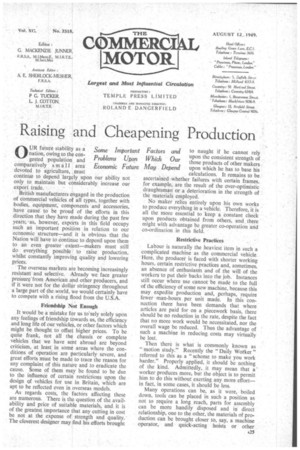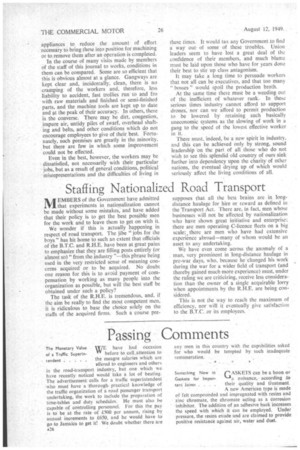Raising and Cheapening Production
Page 27

Page 28

If you've noticed an error in this article please click here to report it so we can fix it.
Some Important Problems Upon Economic Future
0, UR future stability as-a nation, owing to the con • gested population and comparatively small area 'devoted to agriculture, must continue to depend largely upon our ability not only to maintain but considerably increase our export trade.
British manufacturers engaged in the production of commercial vehicles of all types, together with bodies, equipment, components and accessories, have cause to be proud• of the efforts in this direction that they have made during the past few years; 'as, however, exports in this field occupy such an important position in relation to our economic structure—and it is obvious that the Nation will have to Continue to depend upon them to an even• greater extent—makers must still do everything possible to raise production, whilst constantly improving quality and lowering prices.
The overseas markets are becoming increasingly resistant and selective. Already we face greater pressure'from American and other producers, and if it were not for the dollar stringency throughout a large part of the world, we would certainly have to compete with a rising flood from the U.S.A.
Friendship Not Enough It would be a mistake for us to`yely solely upon any feelings of friendship towards us, the efficiency and long life of our vehicles, or other factors which might be thought to offset higher prices. To be quite frank, not all the chassis or complete vehicles that we have sent abroad are beyond criticism, at least in some areas where the conditions of operation are particularly severe, and great efforts must be made to trace the reason for any complaint of this nature and to eradicate the cause. Some of them may be found to be due to the influence of certain restrictions upon the design of vehicles for use in Britain, which are apt to be reflected even in overseas models.
As regards costs, the factors affecting these are numerous. There is the question of the availability and price of suitable materials, and it is of the greatest importance that any cutting in cost be not at the expense of strength and quality. The cleverest designer may find his efforts brought
Factors and Which Our May. Depend
to naught if he cannot rely upon the consistent strength of those products of other makers upon which he has to base his calculations. It remains to be ascertained whether failures with certain frames, for example, are the result of the over-optimistic draughtsman or a deterioration in the strength of the materials employed.
No maker relies entirely upon his own works to produce everything in a vehicle. Therefore, it is all the more essential to keep a constant check upon products obtained from others, and there might with advantage be greater co-operation and co-ordination in this field.
Restrictive Practices Labour is naturally the heaviest item in such a complicated machine as the commercial vehicle Here, the producer is faced with shorter working hours, certain restrictive practices and, sometimes, an absence of enthusiast:11 and of the will of the workers to put their backs into the job. Instances still occur where use cannot be made to the full of the efficiency of some new machine, because this may expedite production and, .perhaps, require fewer man-hours per unit made. In this con nection there have been demands that where articles are paid for on a piecework basis, there should be no reduction in the rate, despite the fact that no more work would be necessitated, nor the overall wage be reduced. Thus the advantage of such a machine in reducing costs may virtually be lost.
Then there is what is commonly known as "motion study." Recently the "Daily Wotker " referred to this as a "scheme to make you work harder." Properly applied, it should be nothing of the kind. Admittedly, it may mean that a" worker produces more, but the object is to permit him to do this without exerting any more effort— in fact, in some cases, it should be less.
Many operations can be, as it were, boiled down, tools can be placed in such a position as not to require a long reach, parts for assembly can be more handily disposed and in direct relationship, one to the other, the materials of production can be brought closer to, say, a machine operator, and quick-acting hoists or other. appliances to reduce the amount of effort necessary to bring these into position for machining or to remove them after an operation is completed.
In the course of many visits made by members of the staff of this journal to works, conditions in them can be compared. Some are so efficient that this is obvious almost at a glance. Gangways are kept clear and, incidentally, clean, there is no cramping of the workers and, therefore, less liability to accident, fast trollies run to and fro with raw materials and finished or semi-finished parts, and the machine tools are kept up to date and at the peak of their accuracy. In others, there is the converse. There may be dirt, congestion, impure air, untidy piles of swarf, overhead shafting and belts, and other conditions which do not encourage employees to give of their best. Fortunately, such premises are greatly in the minority. but there are few in which some improvement could not be effected.
Even in the best, however, the workers may be dissatisfied, not necessarily with their particular jobs, but as a result of general conditions, political misrepresentations and the difficulties of living in these times. It would tax any Government to find a way outof some of these troubles. Union leaders seem to have lost a great deal of the confidence of their members, and much blame must be laid upon those who have for years done their best to stir up class antagonism.
It may take a long time to persuade workers that not all can be executives, and that too many " bosses " would spoil the production broth.
At the same time there _must be a weeding out of the inefficient of whatever rank. In these serious times industry cannot afford to support drones, nor can we afford to permit production to be lowered by retaining such basically uneconomic systems as the slowing of work in .a gang to the speed of the lowest effective worker in it.
There must, indeed, be a new spirit in industry, and this can be achieved only by strong, sound leadership on the part of all those who do not wish to see this splendid old country of ours sink further into dependency upon the charity of other nations, the eventual drying up of which would seriously affect the living conditions of all.




















































































